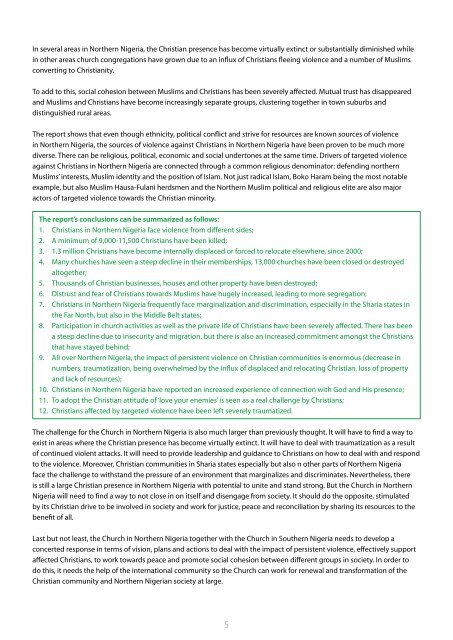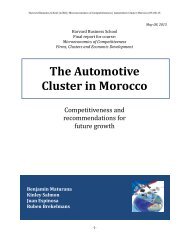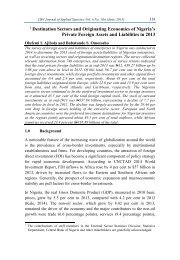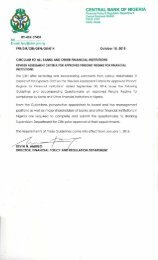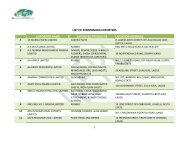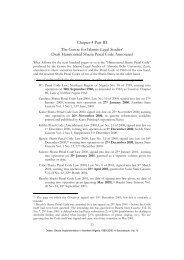Crushed but not defeated
Open_Doors_Nigeria_Kampagne_Report
Open_Doors_Nigeria_Kampagne_Report
You also want an ePaper? Increase the reach of your titles
YUMPU automatically turns print PDFs into web optimized ePapers that Google loves.
In several areas in Northern Nigeria, the Christian presence has become virtually extinct or substantially diminished while<br />
in other areas church congregations have grown due to an influx of Christians fleeing violence and a number of Muslims<br />
converting to Christianity.<br />
To add to this, social cohesion between Muslims and Christians has been severely affected. Mutual trust has disappeared<br />
and Muslims and Christians have become increasingly separate groups, clustering together in town suburbs and<br />
distinguished rural areas.<br />
The report shows that even though ethnicity, political conflict and strive for resources are known sources of violence<br />
in Northern Nigeria, the sources of violence against Christians in Northern Nigeria have been proven to be much more<br />
diverse. There can be religious, political, economic and social undertones at the same time. Drivers of targeted violence<br />
against Christians in Northern Nigeria are connected through a common religious denominator: defending northern<br />
Muslims’ interests, Muslim identity and the position of Islam. Not just radical Islam, Boko Haram being the most <strong>not</strong>able<br />
example, <strong>but</strong> also Muslim Hausa-Fulani herdsmen and the Northern Muslim political and religious elite are also major<br />
actors of targeted violence towards the Christian minority.<br />
The report’s conclusions can be summarized as follows:<br />
1. Christians in Northern Nigeria face violence from different sides;<br />
2. A minimum of 9,000-11,500 Christians have been killed;<br />
3. 1.3 million Christians have become internally displaced or forced to relocate elsewhere, since 2000;<br />
4. Many churches have seen a steep decline in their memberships, 13,000 churches have been closed or destroyed<br />
altogether;<br />
5. Thousands of Christian businesses, houses and other property have been destroyed;<br />
6. Distrust and fear of Christians towards Muslims have hugely increased, leading to more segregation;<br />
7. Christians in Northern Nigeria frequently face marginalization and discrimination, especially in the Sharia states in<br />
the Far North, <strong>but</strong> also in the Middle Belt states;<br />
8. Participation in church activities as well as the private life of Christians have been severely affected. There has been<br />
a steep decline due to insecurity and migration, <strong>but</strong> there is also an increased commitment amongst the Christians<br />
that have stayed behind;<br />
9. All over Northern Nigeria, the impact of persistent violence on Christian communities is enormous (decrease in<br />
numbers, traumatization, being overwhelmed by the influx of displaced and relocating Christian, loss of property<br />
and lack of resources);<br />
10. Christians in Northern Nigeria have reported an increased experience of connection with God and His presence;<br />
11. To adopt the Christian attitude of ‘love your enemies’ is seen as a real challenge by Christians;<br />
12. Christians affected by targeted violence have been left severely traumatized.<br />
The challenge for the Church in Northern Nigeria is also much larger than previously thought. It will have to find a way to<br />
exist in areas where the Christian presence has become virtually extinct. It will have to deal with traumatization as a result<br />
of continued violent attacks. It will need to provide leadership and guidance to Christians on how to deal with and respond<br />
to the violence. Moreover, Christian communities in Sharia states especially <strong>but</strong> also n other parts of Northern Nigeria<br />
face the challenge to withstand the pressure of an environment that marginalizes and discriminates. Nevertheless, there<br />
is still a large Christian presence in Northern Nigeria with potential to unite and stand strong. But the Church in Northern<br />
Nigeria will need to find a way to <strong>not</strong> close in on itself and disengage from society. It should do the opposite, stimulated<br />
by its Christian drive to be involved in society and work for justice, peace and reconciliation by sharing its resources to the<br />
benefit of all.<br />
Last <strong>but</strong> <strong>not</strong> least, the Church in Northern Nigeria together with the Church in Southern Nigeria needs to develop a<br />
concerted response in terms of vision, plans and actions to deal with the impact of persistent violence, effectively support<br />
affected Christians, to work towards peace and promote social cohesion between different groups in society. In order to<br />
do this, it needs the help of the international community so the Church can work for renewal and transformation of the<br />
Christian community and Northern Nigerian society at large.<br />
5


